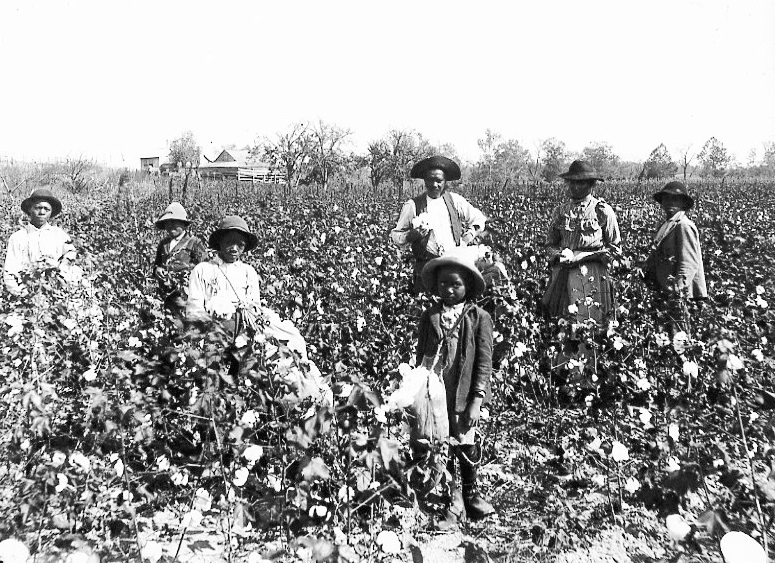
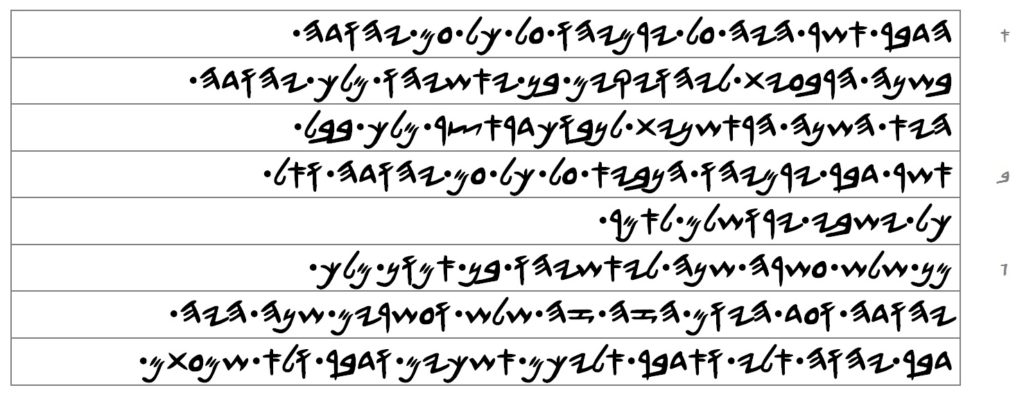
[1] ha-dabar ashar hayh ghal Yaram-Ya’oh ghal chal gham Ya’ohdah ba-shanah ha-rabai’ayth la-Ya’oh-yakaym ban Ya’ash-Ya’oh malach Ya’ohdah hayh ha-shanah ha-ra’ashanayth la-Nabo-chadar-atsar malach Babal
The word which was upon Yaram-Ya’oh concerning all the nation of Ya’ohdah in the year the fourth to Ya’oh-yakaym son of Ya’ash-Ya’oh king of Ya’ohdah: it was the year of the beginning to Nabo-chadar-atsar king of Babal
[2] ashar dabar Yaram-Ya’oh ha-nabay’ ghal chal gham Ya’ohdah wa-al chal yashabay Yaroshalam la-amar
which spoke Yaram-Ya’oh the prophet upon all the nation of Ya’ohdah, and to all the dwellers of Yaroshalam, saying:
[3] man shalash ghasharah shanah la-Ya’ash-Ya’oh ban Amon malach Ya’ohdah wa-ghad ha-yom ha-zah zah shalash wa-ghasharaym shanah hayh dabar YA’OH al-ay wA-adabar alay-cham ashchaym wa-dabar wa-la shamaitham
since the thirteenth year to Ya’ash-Ya’oh son of Amon, king of Ya’ohdah, even until this day, this twenty-third year, was the word of YA’OH unto me, and I spoke unto you, I caused to rise early, and speak, and not have you listened
COMMENTARY OF YARAM-YA’OH 25:1-3
[Verse 1] The prophet Yaram-Ya’oh dates this particular message of his by a double date: to the fourth year of Ya’oh-yakaym (Jehoiakim, 608-597 BCE) and to the beginning of the reign of the Babylonian king Nabo-chadar-atsar (Nebuchadnezzar II, 605-562 BCE). The reason for mentioning a foreign Babylonian king in the date-line is because of the incidents recorded in Danay’al 1:1 and Yaram-Ya’oh 46:2. Nabo-chadar-atsar marched out of Akkad in the third year of Ya’oh-yakaym and conquered Carchemish as the year turned from the third to the fourth year of Ya’oh-yakaym (no contradiction whatsoever exists in this datum).
Yaroshalam submitted to the Neo-Babylonians as Nabo-chadar-atsar marched victoriously through the promised land after the conquest of Carchemish. The beginning of this march to the west is also recorded in the Babylonian Chronicle 23 (l. 27) and 24 (obv. ll. 1–11) in 605 BCE. This was at the start of his dying father Nabopolassar’s terminal twenty-first year. The Babylonian crown prince was in charge of his own army and also the main army of Akkad at the time of the campaign to the west. Thus, Danay’al 1:1 and Yaram-Ya’oh 46:2 cannot be faulted for the anachronism of calling Nabo-chadar-atsar a “king” before he actually was one. There would be no point for the double date in Yaram-Ya’oh 25:1 if Nabo-chadar-atsar had not already made Ya’oh-yakaym his vassal servant (2 Kings 24:1).
[Verse 2] The message Yaram-Ya’oh is about to deliver is for all the nation of Ya’ohdah, i.e. not just the tribe of Ya’ohdah only but all other tribes of Ya’oh-shar-al within the kingdom of Ya’ohdah at that time, and the inhabitants of the capital.
[Verse 3] Yaram-Ya’oh became a prophet in the thirteenth year of King Ya’ash-Ya’oh (Josiah, 604-609 BCE), i.e. 628 BCE, which was twenty-three years prior to the date of this message in 605 BCE. The prophet is saying that he has been at this for twenty-three years and that his people have not listened to him all those years.
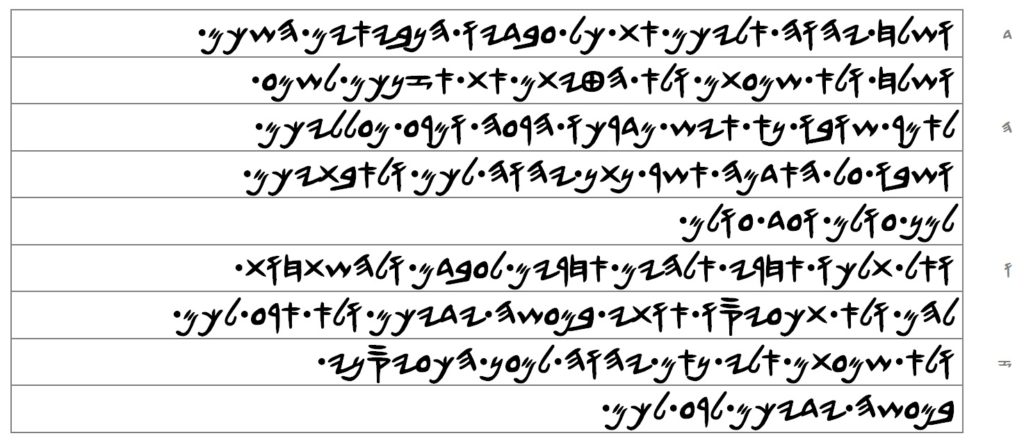
[4] wa-shalakh YA’OH alay-cham ath chal ghabaday’o ha-nabay’a’aym hashcham wa-shalakh wa-la shamaitham wa-la hataytham ath azan-cham la-shamai
and He sent, YA’OH, unto you all His servants the prophets, rising early; and He sent, and not did you listen, and not did you stretch forth your ear to hear
[5] la-amar shobo na aysh ma-daracho ha-raihh wa-ma-rai mailalay-cham wa-shabo ghal ha-adamah ashar nathan YA’OH la-cham wa-la-abathay-cham la-man gholam wa-ghad gholam
saying: Turn now each man from his own way, the evil, and from the evil of your actions, and dwell upon the land which gave YA’OH to you and to your fathers, to from for ever unto for ever.
[6] wa-al thalacho akharay alah’aym akharaym la-ghabadam wa-la-hashathakhoth la-ham wa-la thachai’ayso ‘othay ba-maishah yaday-cham wa-la arai la-cham
and do not walk after gods other to serve them and to bow down to them, and not will you anger me in the work of your hands, and not will I do evil to you
[7] wa-la shamaitham al-ay na’am YA’OH la-main hachai’ays-nay ba-maishah yaday-cham la-rai la-cham
but not have you listened to me, says YA’OH, that it would provoke me by the works of your hands to do evil to you
COMMENTARY OF YARAM-YA’OH 25:4-7
[Verse 4] The prophets were early birds. They got up at the crack of dawn to do their work of teaching the people the Thorah and warning the people about the consequences of disobeying it and wandering into the arms of another god.
[Verse 5] The message is simple. Turn from your evil ways and walk according to the laws of Thorah of YA’OH so that you may live upon the land that He gave your fathers. Every true prophet pushes the exact same message as this one.
[Verse 6] Our promised land depends upon seasonal rainfall for its water, unlike Matsraym where the Nile River supplies all the water farmers need to grow their crops. YA’OH is the kind of Higher Power that He will withhold the rain in the promised land to see if the people will remain loyal to Him, but if they turn and pray to another god for rain then YA’OH will cause it to rain and let them believe in a lie. Evil was in their hearts from the start and now it is fully exposed. YA’OH wants the heart of Ay’ob (Job) 13:15 in His people: han yakatal-nay lo ayKHal (though He will slay me, to Him will I trust…). Your love for YA’OH must be without parallel, unquestionable, and unshakable. Nothing must ever be allowed to diminish it or YA’OH may cause you to believe in a lie and then destroy you for ignorantly believing in it.
[Verse 7] The people refused to listen to the prophets, not caring that their deeds would provoke YA’OH do evil to them. That’s because their prayers to false gods were being answered, and they did not have the wisdom or the intelligence to know that YA’OH was setting them up for destruction. Did the idol god Jesus Christ answer your prayers? I’m sure you believe he did. The same idol god also tells you to forsake the Thorah and to just believe by faith that he saves you by his atonement death on a cross. If you are of the bloodline, from the seed of Ya’oh-ghakab (Jacob), and you believe in the doctrines of satanic Christianity you are being set up. YA’OH created this evil in order for it to be a test for His people, and He will do evil to you if you do not realize He did this and repent.
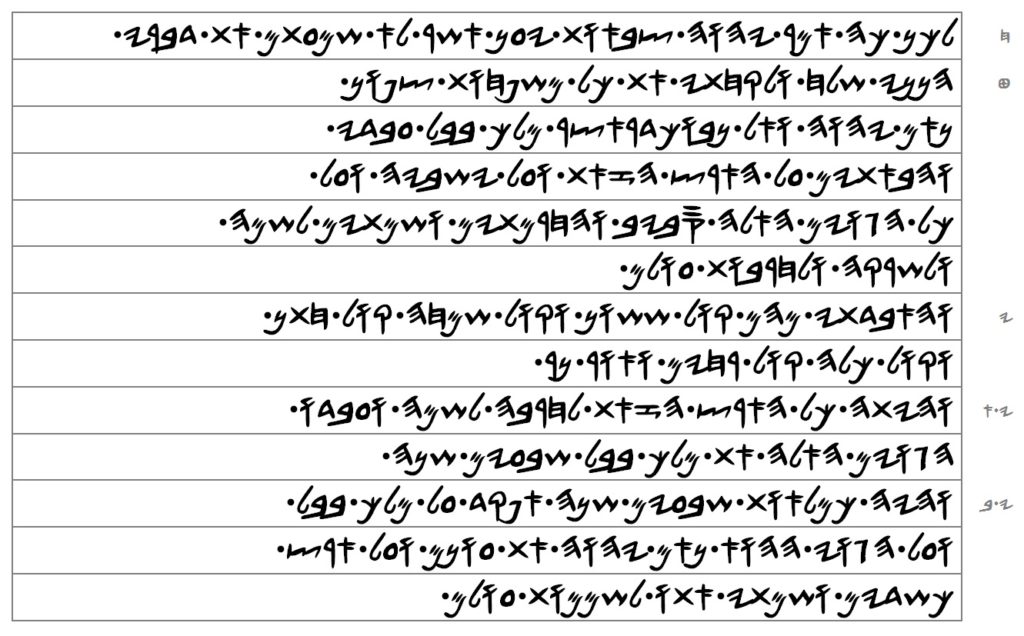
[8] lachan chah amar YA’OH tsaba’oth yain ashar la shamaitham ath dabara-ay
Therefore, thus says YA’OH of Hosts: Because for which not have you listened to my words,
[9] hananay shalakh wA-lakakhthay ath chal mashpakhoth tsapon na’am YA’OH wa-al Nabo-chadar-atsar malach Babal ghabada-ay wA-habathay-m ghal ha-arats ha-za’ath wa-ghal yashabay-ha wa-ghal chal ha-go’aym ha-alah sabayb wA-hakhramthay-m wA-shamthay-m la-shamah wa-la-sharakah wa-la-kharaboth gholam
Behold, I am the one sending and I will take all the families of the north, says YA’OH, and to Nabo-chadar-atsar, king of Babal, my servants; and I will cause to bring them upon this land, and upon the inhabitants of it, and upon all these peoples round about, and I will utterly destroy them, and I will make them an amazement, and for hissing, and for ruins of war perpetually
[10] wA-ha’abadthay ma-ham kol shashon wa-kol shamakhah kol khathan wa-kol chalah kol rakhaym wa-‘or nar
and I will perish from them the voice of gladness, and the voice of rejoicing, and the voice of the bridegroom and the voice of the bride, the sound of a millstone, and the light of a candle
[11] wA-haythah chal ha-arats ha-za’ath la-kharabah la-shamah wA-ghabado ha-go’aym ha-alah ath malach Babal shAbai’aym shanah
and it will be all this land for a ruin of war, for an amazement, and they will serve, these peoples, the king of Babal, units of seven years
[12] wA-hayh cha-mala’oth shAbai’aym shanah apakad ghal malach Babal wa-ghal ha-go’aym ha-ho’ na’am YA’OH ath ghonam wa-ghal arats Chashadaym wA-shamthay atho la-shamamoth gholam
and it will be when it is filled, the units of seven years, I will visit upon the king of Babal, and upon that people, says YA’OH, their punishment, and upon the land of the Chashadaym, and I will make it for desolations perpetually
COMMENTARY OF YARAM-YA’OH 25:8-12
[Verse 8] The consequences for not listening to YA’OH via His prophets, and for not having the wisdom to realize how He moves, is now about to be laid out by the prophet Yaram-Ya’oh.
[Verse 9] Invasions by all the families of the north means way more than just the Babylonians and Babylon is not north of the promised land. It is east of the promised land. Thus, even though Nabo-chadar-atsar will attack from the north, he and his people are just the first of many families to follow his example and lay the land waste by war.
[Verse 10] The whole land will be in turmoil and occasions for joy and happiness will be interrupted by destruction always.
[Verse 11] This verse is NOT saying the people of Ya’oh-shar-al, and all the nations surrounding it, will serve the king of Babylon for seventy years. This is one of the interpretation disasters that have come about when heathens took it upon themselves to explain our book. The prophet is talking about units of seven years and he does not specify how many units will elapse. People are being misled into believing the word “seventy” appears in the text of Yaram-Ya’oh 25:11-12 because of the way the Jewish Masoretes have punctuated the word שבעים in these two verses. If you blindly agree with the Jews to read “seventy” here then you might as well throw the Book of Yaram-Ya’oh in the trash, as this makes him out to be a false prophet. For at no point was the whole promised land, and the heathen nations in that land, turned into a war torn land of desolation and amazement and serving the king of Babylon for seventy years.
[Verse 12] Ancient Babylon was never destroyed, especially not at the end of any imaginary seventy-year period. I’ve said this time and time again, and it bears repeating. From the accession of Nabo-chadar-atsar II in 605 BCE to the end of the Neo-Babylonian regime in 539 BCE is only sixty-six years. Attempts to explain “seventy” as a symbolic figure for these sixty-six years are weak and make no sense given the fact that the ancient Babylonians simply changed their rulers from Babylonian to Persian in 539 BCE. Neither the kingdom nor the capital city were destroyed. The Persians were seen as liberators when they became the new kings of Babylon and everything about the Babylonian way of life, religion, and culture was maintained as it had been before. Nothing became a perpetual desolation. Ancient Babylon only became a dilapidated ruin over time from age and neglect, and not from a destructive invasion.
Therefore, we have to see that the prophet is not saying that Babal would be destroyed and turned into a perpetual desolation at the end of seventy years in the 6th century BCE. What he is really saying is that Babal will be destroyed at the end of an unspecified number of units of seven years, and we have yet to reach the fulfillment of that unspecified number. The city of Babal that is to be destroyed violently is end-time Babal and not ancient Babal. The mention of the land of the Chashadaym is a way of referring to the country with the strongest military on earth, the nation holding the supremacy in the world, without giving out its actual name. Another example of this is found in Ya’oh-khazak-al (Ezekiel) 16:46 where the prophet calls Jebusite Yaroshalam south (at the right hand) of Amorite Yaroshalam by the name Sadam (Sodom).

[13] wA-habathay ghal ha-arats ha-hay’a ath chal dabara-ay ashar dabarthay ghalay-ha ath chal ha-chathob ba-sapar ha-zah ashar nab’ Yaram-Ya’oh ghal chal ha-go’aym
and I will bring upon this land all my words which I spoke upon it, all that which is written in this book which is prophesied by Yaram-Ya’oh upon all the peoples
[14] chay ghabado bam gam hamah go’ay rabaym wa-malachaym gadolaym wA-shalamthay la-ham cha-pail-am wa-cha-maishah yaday-ham
for they will serve in them also themselves many people, and great kings, and I will repay to them according to their deeds, and according to the work of their hands
COMMENTARY OF YARAM-YA’OH 25:13-14
[Verse 13] The prophet was far from finishing his book in 605 BCE when he wrote what is now numbered the twenty-fifth chapter. He had much more to write, but all that he prophesied would happen to his own nation and to heathen nations is suppose to take place during the units of seven years. Here is another very unambiguous reason as to why the word שבעים cannot possibly mean “seventy” in verses 11-12. For example, the simultaneous destruction of Adom (Edom) and Babal prophesied in Yaram-Ya’oh 49:7-22 and Yaram-Ya’oh 50-51 has not happened yet and that means the units of seven years are still in progress and they have not finished running their course.
[Verse 14] The people of Ya’oh-shar-al will be exploited in the exile and made to serve many people and great kings during the units of seven years, but YA’OH will punish all of their oppressors and get a just recompense for His remnant.
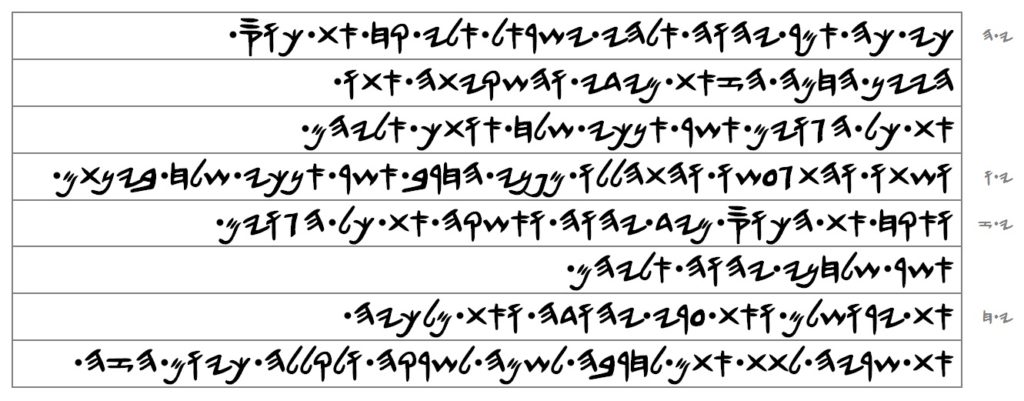
[15] chay chah amar YA’OH alah’ay Ya’oh-shar-al al-ay kakh ath chos ha-yayn ha-khamah ha-za’ath ma-yaday wa-hashkaythah atho ath chal ha-go’aym ashar anachay shalakh ‘oth-cha alay-ham
for thus says YA’OH, the Higher Power of Ya’oh-shar-al: Take the cup of the wine of this fury from my hand, and cause to drink it all the peoples that I am the one sending you unto them
[16] wA-shatho wA-hathagaisho wA-hathahlalo ma-panay ha-kharab ashar anachay shalakh bayntham
and they will drink, and move themselves, and make themselves go mad, from before the sword which I am the one sending between them
[17] wA-akakh ath ha-chos ma-yad YA’OH wA-ashkah ath chal ha-go’aym ashar shalakh-nay YA’OH alay-ham
and I took the cup from the hand of YA’OH, and I caused to drink all the peoples which He sent me, YA’OH, unto them
[18] ath Yaroshalam wa-ath gharay Ya’ohdah wa-ath malachay-ha ath sharay-ha lathath ath-am la-kharabah la-shamah la-sharakah wa-la-kalalah cha-yom ha-zah
Yaroshalam and the cities of Ya’ohdah, and the kings of it, the princes of it; to give them for desolation, for amazement, for hissing, and for curses, as this day
COMMENTARY OF YASHAI-YA’OH 25:15-18
[Verse 15] Taking the cup of the wine of the fury of YA’OH from His hand and making nations drink from it is of course symbolic. It means take the judgments YA’OH has decreed upon the nations, write them down in a book, and declare them publically.
[Verse 16] All of the people who are about to be mentioned by name will drink from the cup, i.e. they will experience everything YA’OH has determined to happen to them, and it will all happen during the units of seven years.
[Verse 17] I repeat, ancient Babylon was never punished and destroyed at the end of any seventy-year period. It simply became dilapidated from neglect over the course of many centuries. Thus, the translation of שבעים שנה at Yaram-Ya’oh 25:11-12 as “seventy years” is incorrect. The correct translation of שבעים שנה in these two verses is “units of seven years”. In Yaram-Ya’oh 29:10 the prophet does mean seventy years when he writes שבעים שנה, but not in Yaram-Ya’oh 25:11-12. The confusion is caused by the late Masoretic punctuation of the plural absolute word שבעים which can be either the number “seventy” or the plural noun for “units of seven” (or weeks) depending upon how the word is inflected in pronunciation.
[Verse 18] The prophet does not tell us how many units of seven years will elapse before the king of Babylon is to be punished and his land and all other nations to be destroyed, but we do know that we are to count the years according to shabath year cycles because Ya’ohdah began to drink from the cup of the wine of the fury of YA’OH, i.e. the desolation of Yaroshalam by the Babylonians began, in the Year 4641 (i.e. 589/8 BCE) which was a shabath year. The people of Yaroshalam were ordered to obey the shabath year law and to release their Ghabaray slaves. They initially did so, but when the Babylonians lifted the siege of the city after hearing news that Matsraym sent an army to help Ya’ohdah they forced their former slaves back into servitude and violated the shabath year (Yaram-Ya’oh 34:1-22; 37:5-7).
The desolations of Yaroshalam ended in 519 BCE when Cyrus of Persia (550/547-517 BCE) issued his word to allow our people to return to the promised land and to rebuild the temple at Yaroshalam. This was seventy years from the start of the Babylonian siege of Yaroshalam in 589/8 BCE (2 Chronicles 36:21-23). However, the desolation of other nations did not begin or end at the same time as Yaroshalam’s desolations. It was always absurd the notion pushed by heathen bible scholars that all the nations Yaram-Ya’oh was sent to with the cup of the wine of fury must all drink from it at the same time and experience desolation for the same seventy years that Yaroshalam did. Each nation has its own individual time-line within the units of seven years to experience destruction and desolation.
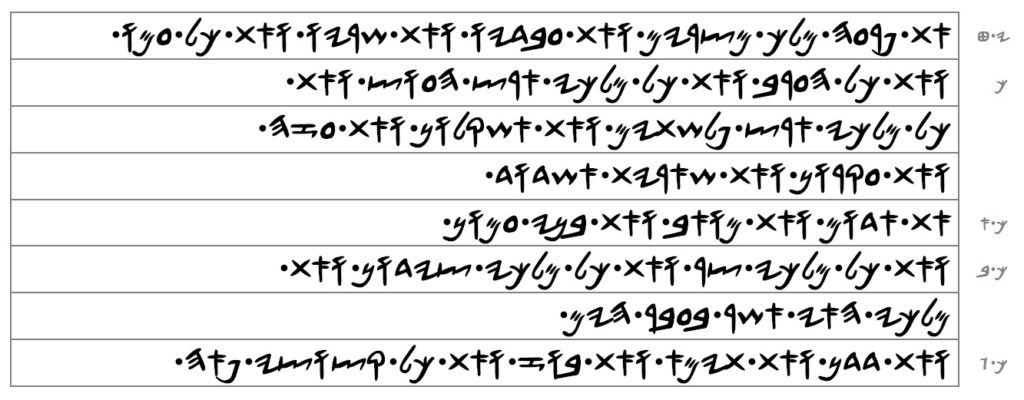
[19] ath parghah malach Matsraym wa-ath ghabaday’o wa-ath sharay’o wa-ath chal gham-o
Pharaoh king of Matsraym and his servants and his princes and all his nation;
[20] wa-ath chal ha-gharab wa-ath chal malachay arats ha-Ghots wa-ath chal malachay arats Palashathaym wa-ath Ashkalon wa-ath Ghazah wa-ath Ghakaron wa-ath sha’aryth Ashdod
and all the mixed people, and all the kings of the land of the Ghots, and all the kings of the land of Palashathaym, and Ashkalon, and Ghazah, and Ghakaron, and the remnant of Ashdod,
[21] ath Adom wa-ath Mo’ab wa-ath banay Ghamon
Adom and Mo’ab and the children of Ghamon,
[22] wa-ath chal malachay Tsar wa-ath chal malachay Tsaydon wa-ath malachay ha-ay ashar ba-ghabar ha-yam
and all the kings of Tsar, and all the kings of Tsaydon, and all the kings of the island which is beyond the sea,
[23] wa-ath Dadan wa-ath Thaym’a wa-ath Boz wa-ath chal katsotsay pa’ah
and Dadan, and Thaym’a, and Boz, and all the ones cut off in a corner,
COMMENTARY OF YARAM-YA’OH 25:19-23
[Verse 19] The Pharaoh of Matsraym and his servants and his princes and all his nation began to drink from the cup of the wine of the fury when the king of Babylon attacked them in 570 BCE, the thirty-fifth year of Nabo-chadar-atsar. The Pharaoh at this time was Apries (588-570 BCE), the fourth king (counting from Psamtik I) of the Twenty-sixth dynasty.
As mentioned earlier in 589/8 BCE, Apries dispatched a force to Yaroshalam to help protect it from the Babylonian forces sent by Nabo-chadar-atsar (Yaram-Ya’oh 37:5-7; 34:21). The Matsraym forces withdrew quickly, however, apparently realizing they were no match for the Babylonian army. After the Babylonians captured Yaroshalam and destroyed the kingdom of Ya’ohdah in 587 BCE, some of the people left in the land by the Babylonians put their trust in Pharaoh Apries and migrated to Matsraym in 586 BCE and took the prophet Yaram-Ya’oh with them (Yaram-Ya’oh 42-44). They were steadfast in their disobedience of Thorah and Yaram-Ya’oh prophesied to them that they would be destroyed in Matsraym and the sign of this would be the death of Pharaoh Apries, similar to the way Tsadak-Ya’oh (Zedekiah) of Ya’ohdah was taken down by Nabo-chadar-atsar (Yaram-Ya’oh 44:30).
Most of what modern European scholars think they know about the end of Pharaoh Apries is derived from the classical Greek historian Herodotus (2.161ff) from the 5th century BCE, but he is an unreliable source. His information cannot be verified by Matsraym monumental evidence. Herodotus does not mention the destructive Babylonian invasion of Matsraym by Nabo-chadar-atsar which is prophesied by Yaram-Ya’oh and also by Ya’oh-khazak-al (Ezekiel). On the basis of Herodotus, modern scholars speculate and theorize that Apries was driven from power by Amasis in 570 BCE and that he later returned to Matsraym in 567 BCE to reclaim his throne with the help of the Babylonian army but was unsuccessful. There is nothing substantive to support this imaginary reconstruction of events.
Modern scholars also speculate that Nabo-chadar-atsar campaigned against Matsraym in 568 BCE, given that a fragmentary Babylonian inscription (BM 33041), from that year records the Akkadian word for Matsraym as well as traces of the name “Amasis” (the name of the then incumbent Pharaoh, Amasis II, 570–526 BCE). The text is too fragmentary to say there was an invasion in 568 BCE. Amasis could be mentioned because he was a vassal installed as pharaoh by Nabo-chadar-atsar in 570 BCE when Apries was captured during the Babylonian invasion of Matsraym. This is the scenario that is supported by the words of the prophets of YA’OH, and I personally will take their word over the words of Herodotus and modern European scholars any day of the week.
The campaign of Nabo-chadar-atsar in 570 BCE penetrated deep into Matsraym. The region between Aswan (Syene) at the First Cataract and the border of Chosh (Nubia) at the Second Cataract was completely devastated and rendered uninhabitable for man and animal for forty years (Ya’oh-khazak-al 29:10-13). Amasis was evidently installed as pharaoh by Nabo-chadar-atsar at the beginning of these forty years and his reign in Matsraym extended only to the First Cataract. He would spend most of his time as king repairing and restoring the temples that the Babylonians destroyed during their rampage of the country. Apries was put to death in Matsraym by Nabo-chadar-atsar (Yaram-Ya’oh 46:25-26) but his remains were not given an honorable burial until Year 3 of Amasis (568 BCE), thus fulfilling the prophecy of Yaram-Ya’oh 44:30. Amasis then married Khedebneithirbinet II, one of the daughters of Apries, in order to legitimize his kingship.
Amasis consolidated his reign in Matsraym by filling the country with foreign Greeks, by relying on Greek mercenaries, and by making alliances with Greek rulers abroad. All of this would have made Amasis unpopular among native Matsraym. At the end of the forty years (570-531 BCE) the native Matsraym who had been scattered and dispersed from the country by the Babylonian army in 570 BCE began filtering back into the land of Pathros in Upper Matsraym. A mamlachah shapalah (lowly kingdom) of composed of just native Matsraym who evidently were unsympathetic to Amasis and his policy of allowing foreign Greeks to settle in the land was established in Pathros towards the end of the reign of Amasis (Ya’oh-khazak-al 29:13-15). This fracturing within Matsraym weakened Amasis and made the country ripe for the Persian conquest in 525 BCE.
All of this to say that the destruction and desolation of Matsraym was not synchronous with the desolations of Yaroshalam for the seventy years from 589/8 BCE to 519 BCE. The units of seven years commenced with the shabath year of 589/8 BCE, but that is not when Matsraym began to drink from the cup of the wine of the fury of YA’OH in the hand of the prophet Yaram-Ya’oh. They began drinking from the cup in 570 BCE with the Babylonian invasion of Nabo-chadar-atsar. After the Persian conquest in 525 BCE, and note that Cambyses of Persia was the “king of Babylon” when he conquered Matsraym in 525 BCE, there would never again be a native Matsraym kingdom to rise up and rule over nations abroad, nor be a source of confidence to the House of Ya’oh-shar-al anymore (Ya’oh-khazak-al 29:16).
[Verse 20] wa-ath chal ha-gharab (and all the mixed people) refers to the mixed multitude of foreigners living in Matsraym. They drank from the same cup as the natives when the Babylonians invaded in 570 BCE.
The land of the Ghots, I have argued, is located in West Africa due to the type fauna that existed in that land as described in the Book of Ay’ob (Job). The word ghots means “dense wooded forest, jungle”. This is not a district in the original homeland of the Adomay (Edomites) at Mount Shair (Seir). It is the land that Adomay migrated to in order to inherit the blessings of Ya’oh-tsakhak and dwell in the fatness of the earth with plenty of dew from heaven above (Thorah 1.27:39). The richness of sub-Saharan West Africa is in view here and not northwest Arabia.
When did the cup in the hand of Yaram-Ya’oh pass over to the Adomay kings in the land of Ghots (Lamentations 4:21) for them to drink from it and rise no more? Not until European colonial rule came to West Africa in the late 19th and early 20th centuries. Yet the Adomay kings in the land of Ghots refused to drink the whole cup and colonial rule in West Africa was mostly over by the 1960s. This means the complete destruction of the Adomay in the land of Ghots is still future and that the units of seven years commencing with the shabath year of 589/8 BCE extends all the way down into the modern era.
As for the kings of the land of the Palashathaym (Philistines) and their cities of Ashkalon, and Ghazah, and Ghakaron, and Ashdod, observe that the city of Gath is omitted of the five Palashathaym towns (Joshua 13:3; 1 Shamo’al 6:17). It had been reduced to total insignificance (Ghamos 6:2) through Ghaz-Ya’oh king of Ya’ohdah when he “broken down” its walls (2 Chronicles 26:6). Gath is equally passed over in Ghamos 1:6-8, Tsapan-Ya’oh 2:4, and Zachar-Ya’oh 9:5, 6. The other four Palashathaym cities took sips from the cup of the wine of the fury of YA’OH during the campaigns of Nabo-chadar-atsar king of Babal, but their complete desolation and when they ceased to exist altogether as a people did not happen until the post-exile period. They lost their distinct ethnic identity and disappeared from the historical and archaeological record by the late 5th century BCE. This proves once again that the units of seven years commencing with the shabath year of 589/8 BCE continue far beyond the 6th century BCE.
[Verse 21] Adom and Mo’ab and the children of Ghamon may have also taken sips from the cup of the wine of the fury of YA’OH during the campaigns of Nabo-chadar-atsar in the 6th century BCE, but these three nations are still here even though they no longer call themselves by their original names, and even though they no longer live in their original homeland in northwest Arabia. The Adomay today are mostly West Africans who share the same Y-chromosome lineage as their younger biological twin brother Ya’oh-shar-al, who they sold to the Europeans during the transatlantic slave trade.
As for the Mo’abites and the Ghamonites, they went into foreign exile “over the sea” (Yaram-Ya’oh 48:32; Yashai-Ya’oh 16:8) to the lands of the Orient, i.e. “unto the men of the east” (Ya’oh-khazak-al 25:10-11). Remnants of the Mo’abites and the Ghamonites will return to their original homeland in the last days (Yaram-Ya’oh 48:47; 49:6), and since we have yet to see this happen it means that verse 21 is predicting the end of the residency of these three nations in their original lands (which happened in the Roman period) and that their complete destruction is still future.
[Verse 22] The kings of Canaanite Phoenician city-states of Tsar (Tyre) and Tsaydon (Sidon) did take a sip from the cup of the wine of the fury of YA’OH when Nabo-chadar-atsar besieged Tsar for several years and put it under Babylonian rule in 572 BCE. The wages of the Babylonian army for having served YA’OH in the lengthy siege of Tsar was to be the conquest of Matsraym two years later (Ya’oh-khazak-al 29:17-21).
However, this was not the full end of Tsar. Neither Nabo-chadar-atsor in 572 BCE, nor Alexander the Great in 332 BCE, destroyed the island city of Tsar. The construction of a causeway built by Alexander the Great to seize the island city from mainland Tsar was later improved upon during Imperial Roman times. The city has continued to exist down into the modern era which means Tsar’s date with doom is still future. The complete destruction of Tsar and Tsaydon will not happen until after the children of Ya’oh-shar-al have left the wilderness and returned to reclaim possession of the promised land (Ya’oh-khazak-al 28:25-26).
The prophet Yashai-Ya’oh tells us that Tsar will experience an unspecified number of units of seven years during which the city will be abandoned and forgotten. These years will run parallel and correspond to the years of an unidentified king (the ravenous bird in the second wilderness), and then Tsar will experience a revival and return to its former glory as an international merchant city. Nevertheless, the merchandise and the hire she will acquire during her rebirth will be seized by the children of Ya’oh-shar-al for their use (Yashai-Ya’oh 23:15-18).
wa-ath malachay ha-ay ashar ba-ghabar ha-yam. All the kings of the island (the Ghabaray word is in the singular and prefixed by the definite article) which is beyond the sea evidently refers to the main island colony of the Phoenicians which was established at Tharshaysh (Tarshish). The modern name of this island is Borneo in the Indonesian archipelago.
[Verse 23] Dadan is a nation descended from Chosh son of Kham (Thorah 1.10:7) and dwelling southeast of Adom. Their caravans maintained a long distance trade between Tsar (Tyre) and Arabia (Ya’oh-khazak-al 27:15, 20). The city of Dadan is still here although it is not going by its original name. It is the Arabic oasis city now called Al’Ula in Medina Province, Saudi Arabia. Another person called Dadan was descended from Abrahm by his wife Katorah (Thorah 1.25:3). Probably he founded a village called Dadan; which, however, in the process of time, was annexed by the Adomay (Yaram-Ya’oh 49:8; Ya’oh-khazak-al 25:13).
Thaym’a (Tayma) is a nation descended from Ya’oh-shamai-al (Ishmael) according to Thorah 1.25:15. The city is still here and is still going by its old name. Dadan (Al’Ula) is located 110 km (68 mi) southwest of Tayma and 300 km (190 mi) north of Medina.
Boz the brother of Ghots was the son of Nakhor, Abrahm’s older brother (Thorah 1.22:21). The city named after him is now called Buzi-ye Seyf (Buz) located in the Buzi Rural District of the Central District of Shadegan County, Khuzestan province, Iran. Alay-ho’ (Elihu), the youngest and wisest of Ay’ob’s friends, was a Bozite (Ay’ob 32:2).
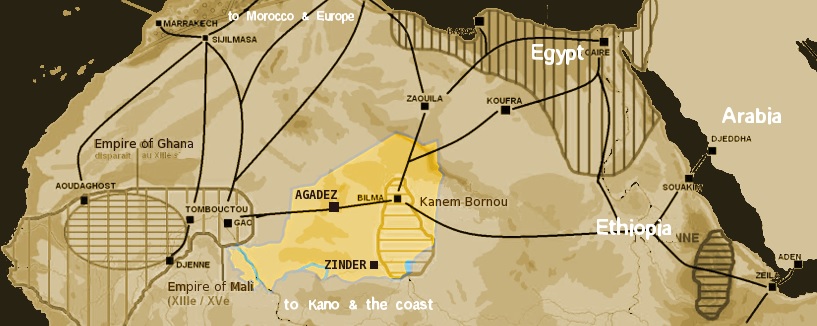
When we think of the trans-Saharan caravan routes connecting Matsraym and Arabia to Western Africa, we tend only to think of the Middle Ages, of Timbuktu, of the Empire of Mali (1226-1670 CE), and of the spread of Islam to sub-Saharan Africa which was linked to trans-Saharan trade routes. The fact of the matter is these routes already existed thousands of years prior – allowing a wealthy man from Boz in Iran to pay a visit to a wealthy friend in Ghots in West Africa, and affording men from Shaba (Sabeans) south of Nubia in East Africa and men from Chashadaym in Mesopotamia with a means for making long distance raids to the west (Ay’ob 1:15, 17).
Ay’ob was from the east and famous among the men in the east (Ay’ob 1:3), but he settled and lived in the west where the herbivore bahmoth (behemoth) dinosaur and various other exotic beasts of the field roamed freely (Ay’ob 40:15, 20). Recent excavations in the country of Niger are revealing thousands of dinosaur fossils. The gigantic bahmoth dinosaur with its tail as big as a cedar tree (the hippopotamus has no such tail, neither does the crocodile!) gets its food from the mountains and trusts that it can put “a” Yardan (Jordan) river into his mouth (Ay’ob 40:23). This Yardan without the definite article prefix must be an older name of the Niger river named after “the” Yardan river in the promised land. The name Niger is very late, possibly Greek in origin, and the river has gone by several other names over time.
wa-ath chal katsotsay pa’ah (and all the ones cut off in a corner). These are the inhabitants of the peninsula of Arabia who are insulated toward the bottom of it in what is now called Yemen.

[24] wa-ath chal malachay gharab wa-ath chal malachay ha-gharab ha-shachanaym ba-madbar
and all the kings of Arabia, and all the kings of the mixed multitude, the ones dwelling in the wilderness
[25] wa-ath chal malachay Zamaray wa-ath chal malachay Ghaylam wa-ath chal malachay Maday
and all the kings of Zamaray, and all the kings of Ghaylam, and all the kings of Maday
[26] wa-ath chal malachay ha-tsapon ha-karabaym wa-ha-rakhakaym aysh al akhay’o wa-ath chal ha-mamlachoth ha-arats ashar ghal panay ha-adamah wa-malach Shashach yashathah akharay-ham
and all the kings of the north, the ones near and the ones far, one to his brother, and all the kingdoms of the world which are upon the face of the earth: and the king of Shashach will drink after them.
COMMENTARY OF YARAM-YA’OH 25:24-26
[Verse 24] The whole country to which has been given the general name of Arabia has two great divisions, one of which is called properly Gharabah/ערבה, the other Kadam/קדם. Gharabah, signifies the west, and Kadam the east. Each of these have their subdivisions; the first, comprehending what geographers have distinguished by the name Arabia Petraea, and those parts along the western coast of the Red Sea bordering upon Matsraym. Kadam corresponds to what was called Arabia Felix and Arabia Deserta, the former of which the scripture has already distinguished by the name katsotsay pa’ah (the ones cut off in a corner) mentioned in the preceding verse 23; and the latter Arabia Deserta in this verse 24, by ha-gharab ha-shachanaym ba-madbar (the mixed multitude, the ones dwelling in the wilderness), meaning those who inhabited the great desert country, lying between Mesopotamia and Palestine. So described because they were made up of different races, and because of their manner of inhabiting the desert promiscuously and in common, without any fixed property or abode, settling for a time, wherever they found pasture, and then moving on with their flocks to another place.
[Verse 25] Zamaray, a name found only here in scripture, was a nation in the Upper Euphrates region. Ghaylam was the nation of Elam centered in the far west and southwest of modern-day Iran. Elsewhere the prophet says the people of Ghaylam would be destroyed and scattered toward the four winds, and that there will be no nation where the outcasts of Ghaylam will not come, but that the captivity of Ghaylam will be brought back in the latter days (Yaram-Ya’oh 49:39). The rise of the Persians in the 6th century BCE is what brought an end to the existence of Ghaylam as an independent political power, but we have not yet seen the return of the captivity of Ghalaym. Maday is Media and their kingdom was terminated in 550 BCE by Cyrus the Persian who was from the city of Anshan in Ghaylam, it having already lost its kings and princes prior to the Persian take over of Ghaylam.
[Verse 26] wa-ath chal malachay ha-tsapon ha-karabaym wa-ha-rakhakaym aysh al akhay’o (and all the kings of the north, the ones near and the ones far, one to his brother) means all of Europe and all of Eurasia (Russia, China, India, etc.). The idea that the prophet’s worldview should be limited to the borders of the Neo-Babylonian empire at the time he was writing in the 6th century BCE is utterly ridiculous. wa-ath chal ha-mamlachoth ha-arats ashar ghal panay ha-adamah (and all the kingdoms of the world which are upon the face of the earth) tells us in no uncertain terms that the entire world is to drink from the cup of the wine of the wrath of YA’OH. Every square inch of earth where people live is included. Many nations have already drank from the cup and have vanished. Others have not drank from it and they are still here, because the units of seven years beginning with the shabath year of 589/8 BCE are still in progress.
All the nations mentioned by name and not mentioned by name are to be destroyed because of something they did, or something they are currently doing, to the chosen people of Ya’oh-shar-al. That’s why YA’OH is making them drink.
wa-malach Shashach yashathah akharay-ham (and the king of Shashach will drink after them). The worst is saved for last. I have argued that since the word for linen in our language is shash, the word shashach must have something to do with a type of fabric. The only fabric this could be is cotton, which is different from linen, but is from a natural fiber producing plant like linen. One lexicon suggests that shashach means “your fine linen” with a possessive pronominal suffix for second person feminine singular. On the other hand, the Jews believe shashach is a Kabbalistic cipher for the word Babal (Babylon). This position is silly to me, for if the prophet is trying to disguise the word Babal in verse 26, why then does he use the word Babal explicitly in the same prophecy in verse 12? The real question for me is why does the prophet switch to calling the kingdom of Babylon by the word for cotton, and the answer is obvious once you understand who the true target audience of the scripture is. The prophet Yaram-Ya’oh is talking in verse 26 about prophetic end-time Babal, the daughter of Babylon, i.e. the Empire of the United States of America.
A large number of early settlers in America grew cotton and early cotton farming in the United States is synonymous with the history of slavery in the United States. It was cotton, and the slaves who planted and picked it, that generated the massive amounts of wealth which propelled the United States into the position as one of the leading economies in the world. To grow, pick, gin (remove seeds) and bale the cotton took a great deal of hard manual labor, so large numbers of OMPP slaves were purchased and imported in order to do this work. The industry was given a boost with the invention of the Cotton Gin in 1793 which increased the demand for slaves. Everyone in this painting below by E. Degas showing the New Orleans Cotton Exchange is wearing cotton, courtesy of OMPP slave labor.
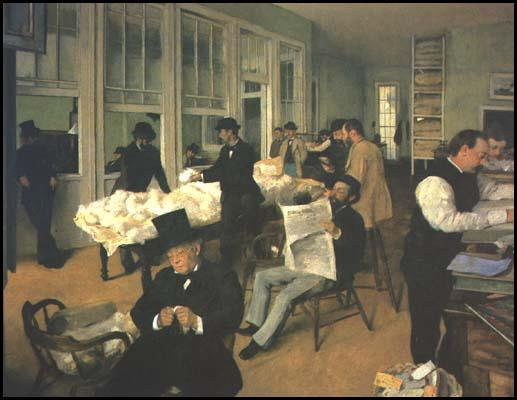
With the aid of a horse to turn the gin a man could clean fifty times as much cotton as before. This increased the demand for slaves. For example, in 1803 alone, over 20,000 slaves were being brought into Georgia and South Carolina to work in the cotton fields. Much of this cotton was exported to Britain where the invention of the Spinning Jenny, the Water Frame and the Power Loom had rapidly increased the demand for raw cotton. By 1850 America was producing 3,000,000 bales of cotton and the industry had become a vital element of the South’s economy.
To this day, even after slavery, cotton is an important economic factor in the United States. Although the United States currently ranks third behind China and India in the production of cotton, the United States of America remains the leader, worldwide, in cotton exportation. We are talking about an annual business revenue stimulated by cotton in the U.S. economy exceeding $120 billion dollars, making cotton America’s number one value-added crop. The farm value of U.S. cotton and cottonseed production is approximately $5 billion. Not one penny of this tremendous wealth has ever been used to compensate the people who were forced to provide the free labor which gave birth to the cotton industry in the first place. Putting this into perspective, the reparations due to my people, just from the cotton industry alone which they built, cannot be less than $120 billion dollars or justice will be perverted.
The prophet Yaram-Ya’oh is not talking about the fall of ancient Babylon which never happened. In no way can a city that became an uninhabited ruin simply from years of neglect be described as having been utterly destroyed in a violent invasion from foreign armies. Nothing of the kind ever happened to ancient Babylon.
According to Yaram-Ya’oh 27:1-7, the kingdoms of Ya’ohdah, Adom, Mo’ab, Ghamon (Ammon), Tsar (Tyre), and Tsaydon (Sidon), and other kingdoms were to serve Nabo-chadar-atsar, his son, and his son’s son, and then the Babylonian empire would become incorporated into many successive kingdoms as a subordinate province. The son of Nabo-chadar-atsar was Belshazzar (Danay’al 5:1-29) who changed his name to Amel-Marduk (563-560 BCE). He was murdered by his brother-in-law Neriglissar (Danay’al 5:30). Nabo-chadar-atsar had no grandson who became king, and therefore the phrase ban bano (son of his son) in Yaram-Ya’oh 27:7 must mean a legitimate successor of Amel-Marduk. That man was Nabonidus (556-539 BCE), the last king of the Neo-Babylonian empire. Neriglissar (560-556 BCE) was a usurper. Thus Neriglissar’s son and successor Labashi-Marduk (556 BCE) was also not a legitimate successor Amel-Marduk. But Nabonidus was because he was married to a daughter of Nabo-chadar-atsar and he was loyal to the royal family.
Nabonidus’s reign came to an end with the victory over his empire by Cyrus the Great in 539 BCE. The Persians entered Babylon without a fight and did not destroy the city. Several sources state that Nabonidus was captured but his life was spared. He was allowed live out the rest of his days in peace in the region of Carmania. So when the prophet Yaram-Ya’oh talks about the wholesale destruction of Babylon (Yaram-Ya’oh 50-51), and the punishment of its king in a violent overthrow in the same way Sin-shar-ishkun, king of Assyria, apparently died defending Nineveh when it fell violently in 612 BCE (Yaram-Ya’oh 50:18), he is not talking about what happened to ancient Babylon and to Nabonidus its last king.
The prophet is talking about the fall of the Empire of the United States of America and its last President in verses 12 and 26. That country is the inheritor of the mantel of Babylonian supremacy. She is the world’s strongest nation, has the most powerful military the world has ever seen, the last nation to enslave and to oppress the chosen people, and therefore she is de facto the daughter of Babylon. The prophet knew this nation would become the Queen of cotton at the expense of his people who would be brought to the New World, the land of pyramids, by slave ships and remain uncompensated for their centuries of hard labor on the cotton plantations. So YA’OH had Yaram-Ya’oh call that end-time Babal by the name shashach (cotton) because He foresaw how this nation would exploit His chosen people and become wealthy by making them pick cotton. He means to obliterate that nation which has dealt treacherously with His people and wipe it off of the face of the earth.
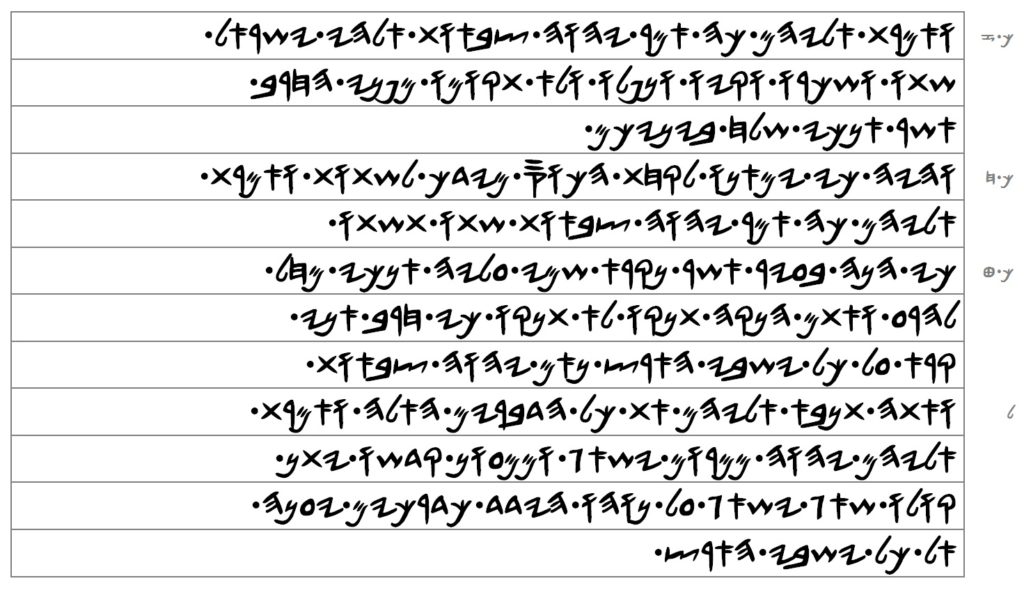
[27] wA-amartha alay-ham chah amar YA’OH tsaba’oth alah’ay Ya’oh-shar-al shatho wa-shacharo wa-kay’o, wa-napalo wa-la thakomo ma-panay ha-kharab ashar anachy shalakh baynay-cham
and you will say unto them, thus says YA’OH of Hosts, the Higher Power of Ya’oh-shar-al, drink, and be drunk, and vomit, and fall, and do not rise from before the sword which I am the one sending among you.
[28] wA-hayh chay yama’ano la-kakhath ha-chos ma-yad-cha la-shathoth wA-amartha alay-ham chah amar YA’OH tsaba’oth shatho thashatho
and it will happen, if they refuse to take the cup from your hand to drink, you will say unto them: Thus says YA’OH of Hosts; drinking you will drink
[29] chay hanah ba-ghayr ashar nakara shamay ghalay-ha anachay makhal la-harai wa-atham hanakah thanako la thanako chay kharab anay kar’ ghal chal yashabay ha-arats na’am YA’OH tsaba’oth
for behold in the city which is called my name, upon it I am the one beginning to do evil, and you absolutely will be clear? You will not be clear, for a sword am I the one calling upon all the inhabitants of the earth, says YA’OH of Hosts.
[30] wa-athah thanab’ alay-ham ath chal ha-dabaraym ha-alah wA-amartha alay-ham YA’OH ma-marom yash’ag wa-ma-mai’on kadash-o yathan kol-o sha’ag yash’ag ghal noh-o haydad cha-darachaym yainah al chal yashabay ha-arats
and you, prophesy unto them all these words, and say unto them: YA’OH from on high will He roar and from His holy dwelling place will He give His voice; He will certainly roar upon His habitation a shout; like the ones who tread will He respond to all the inhabitants of the earth.
COMMENTARY OF YARAM-YA’OH 25:27-30
[Verse 27] The purpose of drinking from the cup is so that the nations who have had a hand in the affliction of the people of Ya’oh-shar-al will be violently destroyed and never rise again for ever.
[Verse 28] Here we see that there will be nations who refuse to drink from the cup, meaning they will be able to avoid the destruction that is determined for them. The prophet is told to tell them that they will certainly drink. They may have dodged the first bullet but they won’t dodge that second bullet, and that second bullet will be YA’OH Himself and not a heathen nation He uses as an instrument to inflict punishment.
[Verse 29] And here is the reason nations who dodged the first bullet will not dodge the second one. YA’OH began to do evil to the city called by His own name in 589/8 BCE. If He does that to His own city of Yaroshalam there is no nation on earth that should go unpunished and not be utterly destroyed. They will all be destroyed. All the inhabitants of the earth are doomed except for the remnant of Ya’oh-shar-al and the wilderness nation hosting them for a time, times, and a half.
[Verse 30] When this moment arrives the nations who have yet to drink from the cup will wish they had and had gotten it over with long ago. This is the end of the world as we know it. The roaring voice of YA’OH from on high is manifested in weather, destructive weather, violent storm tempests, catastrophic thunder, natural disasters, and cosmic portents in the heavens, things that no army on earth, not even the strongest army in human history, can defend itself against.
cha-darachaym yainah al chal yashabay ha-arats (like the ones who tread will He respond to all the inhabitants of the earth). When the vintage harvest is ready, those who tread the wine-press, crushing the grapes beneath their feet, give out a shout of joy because their toil is about to be rewarded with wine. This is a frightening image, because the one who treads this particular wine-press in verse 30 is YA’OH alone (Yashai-Ya’oh 63:3). He is going to trample nations like grapes beneath the feet and spill their blood by His wonders of nature, and not by human conquerors with armies. He is going to rejoice in this worldwide slaughter the same way those who tread the wine-press rejoice by shouting. This will be His response to all the inhabitants of the world.
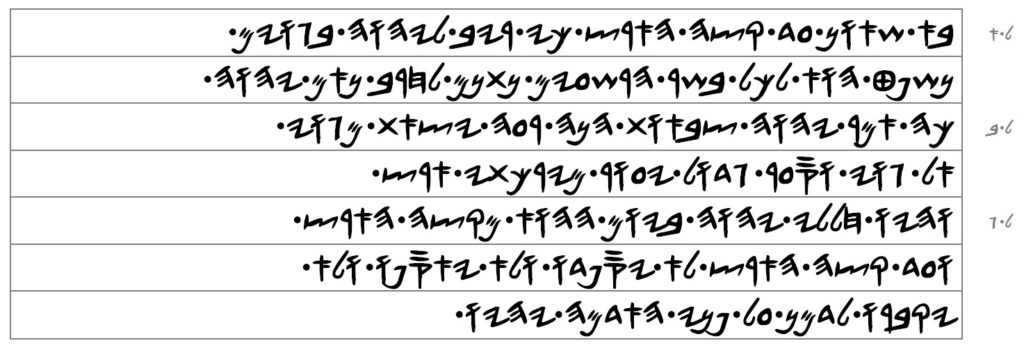
[31] ba sha’on ghad katsah ha-arats chay rayb la-YA’OH ba-go’aym nashapat ho’ la-chal bashar ha-rashai’aym nathan-am la-kharab na’am YA’OH
coming is a tumultuous uproar against the end of the earth for a contention belonging to YA’OH against the peoples; the one judged He is by all flesh; the wicked ones, He is giving them to the sword, says YA’OH.
[32] chah amar YA’OH tsaba’oth hanah raihh yats’ath ma-go’ay al go’ay wa-sair gadol yai’or ma-yarachathay arats
Thus says YA’OH of Hosts, behold, evil will go forth from people to people, and a great storm tempest will be stirred up from the quarters of the earth,
[33] wA-hay’o khalalay YA’OH ba-yom ha-ho’ ma-katsah ha-arats wa-ghad katsah ha-arats la yasapado wa-la ya’asapo wa-la yakabaro la-daman ghal pany ha-adamah yah’ay’o
and they will be, the slain of YA’OH, in that day from the end of the earth, even unto the end of the earth; not will they be mourned, and not will they be gathered, and not will they be buried; dung upon the face of the ground will they be.
COMMENTARY OF YARAM-YA’OH 25:31-33
[Verse 31] When YA’OH stands up to do His wonders of nature and trample all nations like grapes in a wine-press there will be, as can be expected, a tumultuous uproar heard all over the world as millions die horrific deaths. The world has been judging YA’OH, saying He doesn’t exist, and that if He existed He would not allow the world to be the way it is, that He would behave a certain way, etc. They have boldly put their hands upon the apple of His eye, not believing He is there and will do anything about it. They trust and bow to themselves, and to their own idols made by their own hands. Now its YA’OH’s turn to respond to the world and to end His long silence. The world is not going to like what He has to say and how He says it.
[Verse 32] YA’OH, the creator of evil (Yashai-Ya’oh 45:7), will send evil from people to people, and this evil will come to them in the form of violent, destructive weather and catastrophic natural disasters all over the world, killing millions and destroying all of the world’s armies (Yashai-Ya’oh 34:1-2). This is not World War III where human armies fight human armies with human weapons. This is YA’OH Himself weaponizing His weather phenomena against all the peoples and all the armies of the world. He promised He would never again destroy the world by a worldwide flood, but this day of YA’OH that is coming will be far worse than the flood of Nakh (Noah) in many ways.
[Verse 33] Anybody saying we are already seeing verse 33 happen has lost all touch with reality and may need psychotherapy. You’ve seen mass deaths, from powerful storms or from earthquakes, for example, but there is always a rescue crew, people mourning, and bodies being collected for burial. You and I have never seen what this verse is saying will happen. So much for the notion that God loves everyone and wants all nations to be saved. This verse says He intends to slaughter people, millions upon millions of people from one end of the earth to the other end of the earth. Their bodies will not be mourned, will not be collected, and will not be buried. They will be left as dung upon the ground. Only a satan will tell you that YA’OH has since changed His mind and that He doesn’t want to do that anymore. Oh yes He does. Oh yes He will.
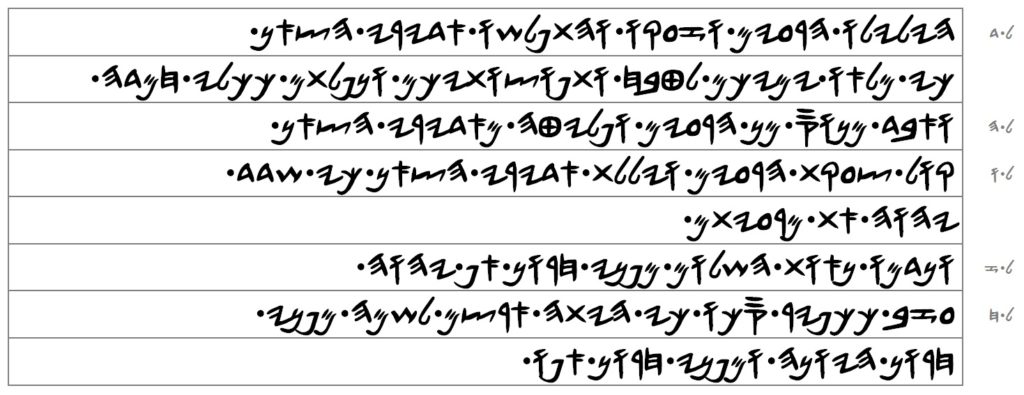
[34] haylaylo ha-rai’aym wa-zaiko wa-hathapalasho adayray ha-tsa’an chay mal’a’o yamay-cham la-tabakh wa-thapotsothay-cham wa-napaltham cha-chalay khamadah
Howl you all, the shepherds, and cry out, and wallow yourselves you principal ones of the flock; for they are accomplished your days for slaughter and your dispersal, and you will fall like a pleasant vessel.
[35] wA-abad manos man ha-rai’aym wa-palaytah ma-adayray ha-tsa’an
and He will perish from the shepherds and from the principal of the flock a way to flee and escape.
[36] kol tsaikath ha-rai’aym wa-yalalath adayray ha-tsa’an chay shadad YA’OH ath ma-rai’aytham
A voice of the crying of the shepherds, and a howling of the principal of the flock; for He spoiled, YA’OH, their pasture.
[37] wA-nadamo na’oth ha-shalom ma-panay kharon ap YA’OH
and they will be cut down the habitations of peace from before the fierce anger of YA’OH.
[38] ghazab cha-chapayr sacho chay haythah arats-am la-shamah ma-panay kharon ha-yonah wa-ma-panay kharon ap-o
He has forsaken, like a young lion, his thicket; for it became their land for desolation from before the ferocity of the one who vexes, and from before the ferocity of His wrath.
COMMENTARY OF YARAM-YA’OH 25:34-38
[Verse 34] The shepherds and the principal ones of the flock are references to the strongest nation on earth, i.e. the Empire of the United States of America, the daughter of Babylon. She polices the nations of the world like the world’s shepherd. Most Americans do not realize the simple, brute fact of U.S. military supremacy. U.S. political elites sold the United Nations to the public as a route to world peace. In reality they wanted it as a cover for militarization. Whenever the United States wants to deploy military force, it can turn to the United Nations to approve and legitimize its action. But there is no way the United Nations could ever meaningfully block unilateral U.S. military action. It is nothing more than a tool of the United States.
Yet the days of her slaughter are fast approaching. The Empire of the United States of America is going to fall violently and be shattered into pieces like an expensive vase, a pleasant vessel, falling from a table.
[Verse 35] The people who are in the United States of America will have no where to flee and to escape after the units of seven years are over. The units of seven years commenced with the Year 4641, the shabath year of 589/8 BCE, when the Neo-Babylonian army of Nabo-chadar-atsar began to rampage and desolate the city of Yaroshalam. That desolation ended seventy years later in 519 BCE, but the units of seven years for other nations continued on, and they will end in a shabath year. Then the king of Shashach, i.e. the POTUS, and all other nations of the world who have not yet drunk from the cup of the wine of the wrath of YA’OH will be forced to drink from it during the wonder years of a time, times, and a half.
This current Year 7252 is a shabath year. It is the 373rd unit of seven years to have elapsed since the Neo-Babylonian siege of Yaroshalam in the 6th century BCE. The number 373 holds no significance, but since the current Year 7252 is the shanath ratson la-YA’OH (the acceptable year of YA’OH) where we are witnessing an Exodus of the exiled remnant of Ya’oh-shar-al from the land of the north (North America), and from other lands where YA’OH scattered us in His wrath, and they are coming to the wilderness one by one, one from a city and two from a family, and not a million people in a single day (Yashai-Ya’oh 27:12; 61:1-2; Yaram-Ya’oh 3:14) then this shabath year is the end of the units of seven years and the following Year 7253 is the beginning of the day of the vengeance of our Alah’aym.
[Verse 36] The units of seven years cannot end until YA’OH has taken His remnant to a place of safety, because the end of the units of seven years will see Him rise up and trample the nations of the world, the Empire of the United States of America being His primary target, by His wonders of nature, like grapes being trampled under foot in a wine-press. The only people guaranteed to survive the cataclysms of these times will be the remnant in the wilderness (Ya’oh-al 2:32) and that poor and afflicted wilderness nation hosting the remnant (Tsapan-Ya’oh 3:12). Everyone else in the world will howl, especially the inhabitants of the United States of America, because YA’OH is going to spoil their pasture and slaughter millions.
[Verse 37] The na’oth ha-shalom (the habitations of peace) is another veiled reference to the nation that has the safest and the wealthiest neighborhoods in the world. That nation is the United States of America, where 136 out of 756 billionaires in the U.S. reside in New York City alone. The city remains the billionaire capital of the world. Imagine the screams and the howling that will be heard when YA’OH tramples that city with its uber-rich population like grapes in a wine-press.
[Verse 38] The last verse in the chapter of an incredible prophecy. The image of verse 30 is here reproduced in verse 38. The loud thunder of the wrath of YA’OH in the form of violent weather phenomena and catastrophic natural disasters is as the roaring of a young lion. YA’OH is forsaking His thicket, like a young lion, to execute His vengeance upon the world. Their lands are to become desolate because of the ferocity of YA’OH, the one who will vex them in the ferocity of His wrath.
He spoke by me when He told me to prophesy the year of the Exodus seven years ahead of the time, and He did not let my words fall to the ground. Those reading this blog post but have not been called to the wilderness in the east where the remnant is gathering had better pray He is not speaking by me anymore, because if He is you are in great danger.
His name is YA’OH
Always has been. Always will be.
#EXODUS2023
1.15.7252 (April 5, 2023)
